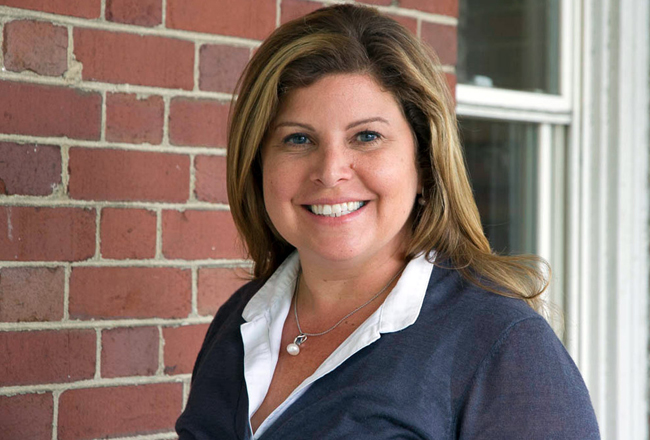The stress experienced by immigrants and refugees is always considerable, from trying to master a new language to learning the complexities of a new mainstream culture.
And bringing on additional pressures from a political climate that many consider to be less welcoming to newcomers and a health crisis that doesn”™t discriminate based on race or ethnic heritage can make a difficult situation more harrowing.

But Susan Schnitzer is ready for the challenge. In January, she became president and CEO of the Connecticut Institute for Immigrants and Refugees (CIRI), the Bridgeport-headquartered nonprofit that works to integrate newcomers to this nation into the wider American fabric.
Schnitzer, who was at CIRI for more than three years as the agency”™s director of programs and compliance before taking the leadership helm, is tasked with ensuring the individuals and households that come to CIRI will become self-sufficient.
Schnitzer said her initial goals as CIRI”™s new chief executive is to “build on the really strong base that my predecessors have put into place from providing holistic services for refugees, immigrants and survivors of trafficking in our community and throughout the state of Connecticut.”
She noted that different people come into the region through different circumstances: the majority of immigrants and survivors of human trafficking arrive from Latin America, while refugees are overwhelmingly African, joined in lesser numbers by people from the Middle East, Afghanistan and parts of the defunct Soviet Union.
CIRI works with up to 3,000 cases per year. According to Schnitzer, the organization gets started immediately with each new case it is provided.
“We provide intensive case management services for the first three months, which includes finding apartments, getting everybody set up in their apartments and then working on employment English-language proficiency, helping those with children register for school and really integrating into them the community,” she explained.
“We have four case managers working in collaboration on all of those things. And we also have a very robust mentoring program, where we have approximately 70 mentors, working with about 125 clients, and they will assist with English-language learning, showing people how to use the laundromat or the grocery stores are and then also how to access free activities through the libraries and the zoos and the parks and beaches.”
For many newcomers the culture shock can be intense, Schnitzer said, and CIRI works to make the transition into the American culture easier. For example, the agency works with area churches to provide a move-in residence rather than a bare unit.
“When they arrive here in Bridgeport and get to their homes, it”™s actually a home,” she said. “It”™s beautifully decorated, it’s welcoming, the fridge is stocked with food. We provide for community orientation, so we show them what the stove is, how to use the refrigerator, how to regulate heat from the thermostat. And then we build on that through the individual case meetings, and then through a monthly health and wellness workshops, and then in ongoing groups.”
Today, a new stress on immigrants and refugees involves COVID-19. Schnitzer noted that CIRI was prepared for communicating with its newcomers thanks to previous years where arrivals from more humid and tropical climates suddenly found themselves dealing with colds and the flu in the region”™s frigid winter months.
“We are going along those same lines because the same type of activities will be helpful: the hand washing, cleaning surfaces with bleach and just being very careful about being around people who are sick,” she said, adding that CIRI is no stranger to health crises. “With people who came from Congo, they had a civil war going on as well as the Ebola crisis.”
A more visible concern to many immigrants and refugees is the presence of law enforcement, especially for those who come from countries where abusive behavior by police or military forces is rampant. Schnitzer pointed out that local law enforcement has been very helpful in alleviating those concerns.
“We have an officer from the Bridgeport police force that comes to our quarterly community meetings, which is a gathering of agencies that are working with refugees and immigrants on how we can better serve very direct services,” she said. “And we have a detective from the Fairfield Police Department that has come and presented many times in our woman’s group, so that they put friendlier faces and collaborative faces to law enforcement. We also work with the FBI, which is extremely helpful in doing outreach to communities. One of the agents we worked with has worked with a local mosque to go in and talk to folks there about what that their rights are. We’re lucky that we have those partners that can really help us.”
But CIRI itself is not free of challenges, especially on the monetary side. Due to the pandemic, CIRI had to cancel two of its biggest fundraisers of the year ”“ the Motown Dance Party and Evening to Benefit CIRI in Hartford ”“ in favor of an online-exclusive silent auction. And while the online event will bring in some funds, the challenge to CIRI”™s budget is still acute.
“About a little less than half of our funding comes from the federal government and the rest comes from private foundations and individual giving,” Schnitzer said. “With our immigration legal services, we have a sliding fee scale to keep them affordable and far under what a private attorney would charge.”
Schnitzer is also eager to expand CIRI”™s relations with the private sector, pointing to its job placement program to match individuals with local opportunities. She is also ready to withstand any new political winds that would seek to demonize immigrants and refugees.
“We’re not going anywhere,” she said. “The more of an issue there is, the harder that we work to make sure that we’re serving the people who are here and who are coming here.”




















